Facebook Hustles: The Hidden Mechanics of a Scam Machinery Impersonating News Organisations and Creators
In an extensive month-long investigation, our team has unearthed a large-scale scam operation, recruiting its victims on Facebook through ads. This eye-opening discovery not only reveals the sheer scale of the problem but also underscores the urgent need for platforms to take responsibility in enforcing their own rules, especially ahead of the implementation of the DSA. The scam, which involves over 1,500 ads and a network of deceitful media sites, targets unsuspecting users with the promise of lucrative investments, leading to significant financial and personal harm.
The scam thrives on the proliferation of deceptive ads strategically designed to trick Facebook users. These advertisements employ sensational language, feature prominent media figures from many countries, and exploit the allure of scandalous events, all with the aim of enticing users into clicking on their clickbait headlines. However, once clicked, these ads redirect users to counterfeit media organisation websites that serve as a front for fraudulent activities. Impersonated media include Le Monde, the BBC, Süddeutsche Zeitung and more.
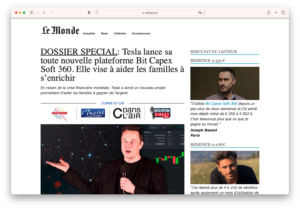
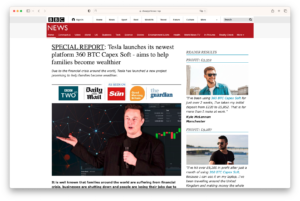
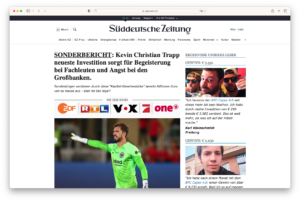
Personal Data Collection and Financial Exploitation
Upon reaching the false media websites, users are presented with what appears to be an account creation form for a supposed lucrative investment platform. This form is actually a cleverly disguised personal data collection tool. Victims share their contact data with the scammers, who then contact them via phone. The fraudsters employ persuasive tactics to convince users to send money through a fictitious investment platform.
Exploitation of Facebook Pages and Social Engineering
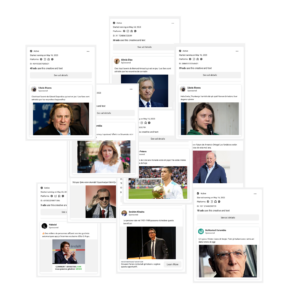
To propagate these fraudulent ads, the scammers have seized control of numerous Facebook pages through cunning social engineering techniques. In our observations, scammers targeted mainly artists and creators in what has come to be known as the “Tony Terry Scam,” wherein the scammers lure them into giving control of their pages through false collaboration proposals. By gaining admin access to these established pages, the scammers are able to place dubious ads.

The Complexity of the Scam Operation
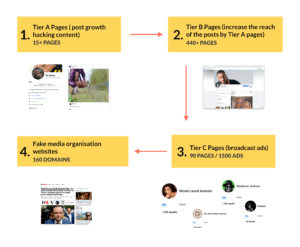
The infrastructure behind this scam is intricate. The scammers employ a network of three-tier Facebook pages to maximize their fraudulent activities. The first tier consists of pages that continuously post viral content, while the second tier acts as recruitment pages by reposting the content. Finally, the third tier comprises smaller pages owned by artists or creators, which are used to place the ads.
To support their scam, the perpetrators have gone to great lengths to create forged media websites that impersonate reputable news organizations. These websites serve as landing destinations for the scam ads displayed on Facebook. With clickbait articles promoting get-rich-quick schemes and fabricated testimonies, the scammers prey upon users’ desires for financial gain. Moreover, they utilize counterfeit e-commerce sites to circumvent Facebook’s verification measures, further exacerbating the issue.
Rules exist but their enforcement is insufficient. A cautionary tale ahead of the implementation of the DSA.
This investigation serves as a stark reminder of the importance of user awareness and vigilance on Facebook and social media at large. But platforms and service providers themselves bear responsibilities. The scam operation we uncovered violates many rules as established in the terms fo service of Meta as well as those of registrars and hosting services used by scammers to run their forged websites. As our partner EU Disinfolab points out in their upcoming paper based on our investigation, many upcoming rules set by the Digital Services Act are not followed. This tells a cautionary tale about the capacity of platforms to observe the DSA in the near-future.




